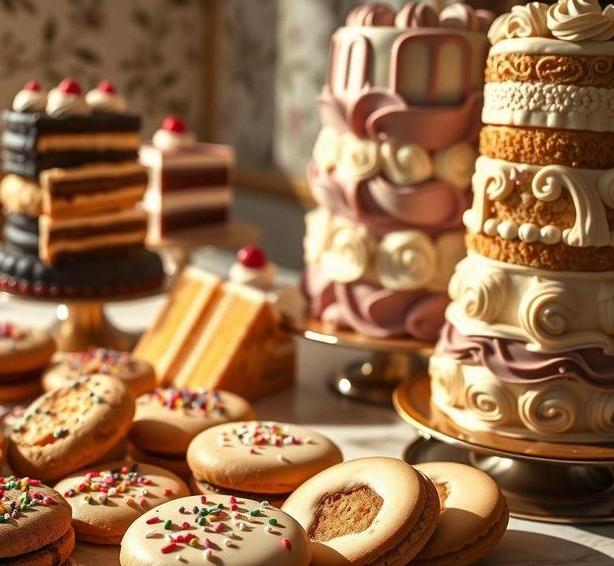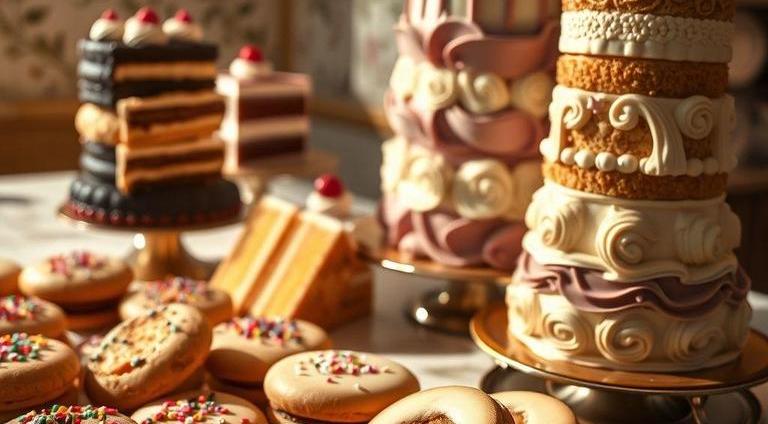Cookies and cakes are two of the most beloved treats, bringing joy to almost any occasion. Whether it’s a homemade batch of warm cookies straight out of the oven or a beautifully frosted cake at a birthday party, these sweet delights always seem to have a special place in our hearts and on our plates. But as with any food, there’s always the question: can cookies and cakes actually go bad? Sure, they’re delicious now, but what happens a few days-or even weeks-down the road? Understanding how these baked goods can spoil, how to keep them fresh, and how long they actually last is crucial for anyone who enjoys baking or simply indulges in a store-bought treat every now and then.
So, let’s dive into the details. You’ll not only learn about the shelf life of cookies and cakes but also how to keep them as fresh as the day they were made.
Can Cookies And Cakes Go Bad?
Yes, cookies and cakes can definitely go bad! While they might seem invincible as they sit on the counter, their fresh-baked goodness doesn’t last forever. Over time, these delightful baked goods can lose flavor, texture, and even become unsafe to eat.
Here’s why:
- Moisture Content: Cakes, especially, have a higher moisture content compared to cookies. This makes them more prone to mold growth if not stored properly.
- Sugar and Fat: While sugar and fat act as preservatives to an extent, they only do so for a limited time. Over weeks, they can lead to stale textures, or in the case of cakes, soggy layers.
- Environmental Factors: Exposure to heat, humidity, and light can accelerate the spoilage process. Even the best of cakes and cookies will deteriorate faster if they are not stored in a cool, dry place.
But don’t worry! We’ll get into how you can make them last longer so you can enjoy that fresh flavor for as long as possible.
Shelf Life For Cookies And Cakes

The shelf life of cookies and cakes is determined by several factors, including their ingredients, how they’re baked, and how they’re stored. Here’s a detailed look at how long these treats can last:
-
Cookies
- Room Temperature: Most homemade cookies can last about 1-2 weeks if stored in an airtight container. If you’re dealing with cookies that are more delicate or have ingredients like cream cheese or fresh fruit, this shelf life might be shorter.
- Refrigerated: If you refrigerate your cookies, they can last up to 3 weeks. But be aware that they might lose some of their chewy texture and crispness, depending on the type.
- Frozen: For long-term storage, freezing cookies is an excellent option. They can last up to 6 months or even longer when stored in an airtight bag or container. Just be sure to freeze them as fresh as possible, and they should retain their flavor and texture when thawed.
-
Cakes
- Room Temperature: Most cakes can last for about 3-4 days at room temperature, assuming they are properly covered. Cakes with fresh fillings or frosting (especially dairy-based) should be consumed sooner, generally within 1-2 days.
- Refrigerated: If you’re dealing with cakes that have cream-based frosting or are filled with fruit or custard, you should store them in the fridge. Under these conditions, cakes can last about 5-7 days.
- Frozen: Cakes freeze exceptionally well. You can wrap them tightly in plastic wrap, followed by aluminum foil, and they can last in the freezer for up to 3 months. When ready to enjoy, just let them thaw at room temperature for the best texture.
Common Signs Of Spoilage
It’s important to know when cookies or cakes have gone bad, so you don’t accidentally bite into something unpleasant (or worse, unsafe). Here are some common signs of spoilage:
- Mold Growth: If you see any fuzzy or greenish spots on your cookies or cake, that’s mold, and it’s a clear sign they are no longer safe to eat. Mold thrives in moist environments, which is why cakes are especially vulnerable.
- Unpleasant Odor: Fresh cookies and cakes usually have a sweet, pleasant aroma. If they start to smell sour, rancid, or “off”, it’s a sign that they’ve begun to spoil. For cakes with dairy-based frostings, this might be especially noticeable.
-
Change In Texture
- Cookies: Stale cookies will become hard and dry, losing their chewy texture. If your cookies have become too dry to enjoy, it’s best to discard them.
- Cakes: If a cake’s texture has turned excessively dry, crumbly, or tough (especially in the case of cakes with frosting), that’s a clear sign that the moisture has evaporated, and it’s no longer fresh.
- Discoloration: Sometimes, the cake or cookie may not show visible mold but could develop discolored patches. For example, cakes can start to dry out, making their surface appear pale and cracked.
How To Store Cookies And Cakes?

The way you store your cookies and cakes can significantly impact their freshness. Proper storage helps to lock in moisture, prevent drying, and protect them from contaminants. Here are some helpful guidelines for storing your baked goods:
-
For Cookies
- Airtight Containers: Store cookies in an airtight container to prevent them from drying out. A cookie jar with a tight-fitting lid works wonders for this. For extra freshness, you can place a slice of bread inside to keep the cookies soft.
- Parchment Paper: If you’re stacking cookies in a container, place parchment paper between layers to prevent them from sticking together.
- Avoid Direct Sunlight: Keep cookies in a cool, dry place, away from sunlight and heat, which can accelerate spoilage.
-
For Cakes
- Cover with Plastic Wrap or Aluminum Foil: This helps to maintain moisture and prevent the cake from drying out. If the cake is frosted, wrap it gently to avoid messing up the frosting.
- Use a Cake Dome or Box: A cake dome or a box with a tight seal is a great way to store cakes at room temperature.
- Refrigerate When Necessary: Cakes with perishable fillings or frostings (like whipped cream or cream cheese) should be refrigerated, but be sure to cover them properly to avoid the cake absorbing any unwanted odors from the fridge.
- Freeze for Long-Term Storage: If you don’t plan to eat your cake within a few days, freezing is your best bet. Wrap it tightly and place it in an airtight container or freezer bag.
Expert Tips
- For Stale Cookies: If your cookies start to go stale, you can bring back some of their softness by placing a damp paper towel in the container with them for a few hours. The moisture helps to rehydrate the cookies, making them softer.
- For Freezing Cakes: If you freeze a cake, consider freezing it in layers (without frosting) for easier storage and thawing. You can frost it once it’s thawed to maintain the best texture.
- Avoid Storing Cookies and Cakes Together: Because cakes have a higher moisture content, storing them with cookies can cause cookies to lose their crispness. Always store them separately!
- Check Expiry Dates: When buying pre-packaged cakes or cookies, always check the ’best by’ or ’use by’ dates. These dates provide an estimate of how long they’ll stay fresh.
FAQs
Can Cookies Go Bad?
Yes, cookies can go bad. Over time, exposure to air, moisture, or heat can cause cookies to lose their flavor, texture, and freshness. Stale cookies may become hard or soft, depending on their ingredients and storage conditions.
How Long Do Cookies Last Before They Go Bad?
Cookies typically last 1 to 2 weeks when stored in an airtight container at room temperature. For longer shelf life, they can be refrigerated for up to 3 weeks or frozen for up to 6 months.
How Can You Tell If Cookies Have Gone Bad?
Cookies that have gone bad may show signs such as an off smell, mold, or an overly hard or chewy texture. If they taste stale or have an unusual flavor, they are no longer safe to eat.
Can Cakes Go Bad?
Yes, cakes can go bad as well. Cakes, especially those with perishable ingredients like cream or frosting, can spoil faster than cookies. Exposure to air or moisture can also cause cakes to dry out or become moldy.
How Long Do Cakes Last Before They Go Bad?
Cakes generally last 2 to 5 days when stored in an airtight container at room temperature. If refrigerated, cakes can last up to 1 week, but the texture may suffer. Cakes with cream fillings or frosting may last 1 to 3 days outside the fridge.
Can You Eat Cakes And Cookies After The Expiration Date?
While cakes and cookies might still be safe to eat after their expiration date, their quality will likely have declined. It’s important to check for signs of spoilage such as unusual smells, mold, or changes in texture before consuming.
How Should Cookies And Cakes Be Stored To Prevent Them From Going Bad?
To preserve freshness, store cookies and cakes in airtight containers. For cakes, wrap them tightly in plastic wrap or aluminum foil and keep them in a cool, dry place. If storing for longer periods, refrigerate or freeze them.
Can You Freeze Cookies And Cakes To Prevent Them From Going Bad?
Yes, both cookies and cakes can be frozen to extend their shelf life. When freezing cookies, place them in a single layer on a baking sheet before transferring them to an airtight container or freezer bag. Cakes should be wrapped tightly in plastic wrap or foil and placed in a freezer-safe container.
What Are Some Common Signs That Cookies Or Cakes Have Gone Bad?
Common signs of spoilage include mold growth, off smells, changes in texture (such as a soggy or excessively dry texture), and changes in color. If they appear or smell unusual, it’s best to discard them.
Can Homemade Cookies And Cakes Go Bad Faster Than Store-bought Ones?
Yes, homemade cookies and cakes may spoil faster than store-bought versions due to the lack of preservatives. Store-bought treats often contain ingredients that help prolong freshness, such as artificial preservatives or stabilizers.